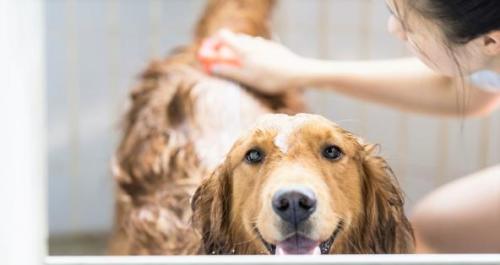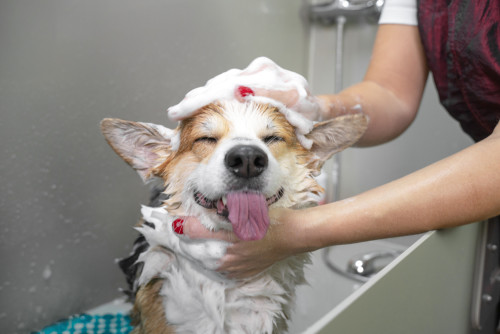
Why Is My Dog Itching So Much?
It seems like dogs often scratch themselves, but how do you know when it's a sign they have more than the occasional instinctive desire to scratch and when they really have an itch?
While your furry friend can’t speak for themselves, there are some telltale signs that their itching can be a sign of a larger problem.
Read on to learn more about why your furry friend may be scratching and tips for how to help your itchy pup be more comfortable.

Reasons Your Dog Might Be Itchy
Diet and Itching
Just like humans, dogs can have allergic reactions to their food which can cause itching. Things to watch out for in diet-related allergies are itching and scratching, hives, hair loss, chewing or licking paws, or runny eyes.
According to a survey run by We Feed Raw, we found that 79% of pet parents who switched their dogs to a raw diet saw a decrease in allergy symptoms. This is due to the food being made up of things your dog was meant to ingest, and not the things dogs aren’t–dogs in the wild don’t eat corn, wheat, soy, and legumes, but that’s what much of the processed dog food is made up of.
Your pup’s gut health and skin health are closely tied. The same survey found that 88% of pet parents said their dogs’ skin and coat got healthier on a raw diet. The clean, raw, bioavailable nutrition allows the body to function optimally, resulting in shiny, picture-perfect, and comfortable coats.
Other Allergens
Another question many people ask when they see a dog scratching a lot is “Does this mean my dog has fleas?”
The answer to this question is: it depends. Yes, fleas can definitely make your dog itch. But what you may not know is that it’s not flea bites that make your dogs itch, but flea allergy dermatitis–your dog is allergic to fleas! It’s not the case in all dogs, and not all dog scratching is caused by fleas, but it’s something to be aware of.
Pruritus is the medical term for itching, and it can be associated with a whole host of problems–some of which require a trip to the veterinarian–but the two most common reasons are flea allergies and dry skin.
One of the worst parts of pruritus in dogs is that it can create even bigger problems. Dogs that have a legitimate cause to scratch may rub themselves raw and even draw blood. The scabs that form will only increase the need to scratch, creating an uncomfortable cycle.
The best thing to do is to nip itching in the bud.

How to Help Dogs with Dry Itchy Skin
How do you know when itching means something is seriously wrong and warrants a trip to the vet? A few scratches may not be a cause for concern, but it’s always a good idea to keep an eye on your pooch if these behaviors persist.
Things to watch for include:
•Constant scratching or licking
•Restlessness and difficulty getting comfortable
•Loss of appetite
•Lethargy
If your pup suffers from any of those problems, make an appointment with the veterinarian. Your dog may have a serious problem that needs to be addressed by a professional, such as a skin infection, food allergies, and more.
Home Remedies for Itchy Skin
There are some home remedies that you might want to consider for your dog before taking them to the vet, assuming they’re not suffering severely. Some such remedies are:
•Colloidal Oatmeal Baths: You can make a colloidal oatmeal bath on your own (which involves grinding the oats finely), or you can buy it ready-made. It’s non-toxic and can work wonders with multiple applications.
•Coconut Oil: To use this, chill and solidify the coconut oil and then rub it into the dog’s skin, being gentle with irritated skin. It can be used to treat eczema, skin infections, and bug bites when used as a lotion.
•Aloe Vera: Just like aloe vera is good for your sunburns, it can be good for your dog's raw skin. You can buy 100% natural aloe vera to make sure it's free from chemicals.
•Baking Soda: Make a paste with 50% baking soda and 50% water, then apply the mixture to dry skin—it can do wonders for your dog. If your dog is itching all over, consider adding some baking soda to their bathwater.
How to Help Itchy Dog Ears

Itchy ears can be troublesome and typically indicate a bacterial or fungal infection. A medicated ear wash like Vetericyn Antimicrobial Ear Rinse may help, but we also recommend taking your dog to the vet to have them determine the cause of your pup's ear infection and prescribe an appropriate medication.
How to Help an Itchy Dog After Grooming
Severe matting—and the methods required to remove it—can lead to many problems that could cause your dog to itch. First, try one of the above remedies or wash your dog with a medicated shampoo. If the itching is severe, take your dog to the vet to find out the underlying problem.
A Comfortable Dog Is a Happy Dog
If you’re concerned about your dog’s itching and scratching, follow the steps that we’ve provided above. And don’t forget about how important diet is to dogs with allergies and sensitivities. These things can be the worst causes of itching for your pup, regardless of age. Make sure that you get them on the right diet, right away.

Complete & balanced raw meals.
Portioned out, packaged up, and cold-shipped (for FREE!).
